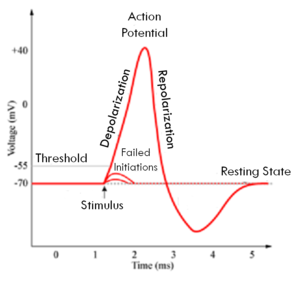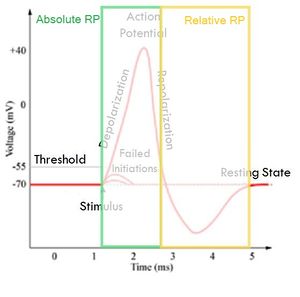Refractory Period
Definition[edit | edit source]
The Refractory Period is one of the many phases of the action potential of a cell.
It can be said that the Refractory Period is the period of time during which an organ or a cell can’t repeat a certain action.
It is the amount of time it takes for an excitable membrane to be ready for a second stimulus, after it returns to its resting state, that was followed by an excitation.
A new action potential cannot occur in an excitable fiber as long as the membrane is still hyperpolarized from the previous action potential.
Why?[edit | edit source]
Shortly after the begining of the action potential the sodium and/or calcium channels become inactivated, so there is no signal that could open these inactivated gates.
During the refractory period the membrane potential returns to (or near) the original resting membrane potential level.
Whithin a small fraction of a second the gates of the channels open and a new action potential can be initiated.
Absolute and Relative Refractory Periods[edit | edit source]
Absolute: Is the period of time during which a second action potential ABSOLUTELY cannot be initiated, no matter how large the applied stimulus is.
Relative: Is the interval immediately following the Absolute Refractory Period during which initiation of a second action potential is INHIBITED, but not impossible. As voltage-gated potassium channels open to terminate the action potential by repolarizing the membrane, the potassium conductance of the membrane increases and the K+ ions move out of the cell and bring the membrane potential closer to the equilibrium potential for potassium and this can lead to membrane hyperpolarization.
Membrane Hyperpolarization[edit | edit source]
The membrane potential becomes more negative than the normal resting potential. Until the potassium conductance returns to the resting value, a greater stimulus will be required to reach the initiation threshold for a second depolarization. The return to the equilibrium resting potential marks the end of the relative refractory period.
Conclusion[edit | edit source]
The Refractory Period has two different phases: Absolute and Relative and can be defined as the period of time when no other action potential can occur. The graph below shows these two different stages:
References[edit | edit source]
Guyton, Arthur C.; Hall, John E. Guyton and Hall textbook of medical physiology. 12th ed. USA: Saunders, 2011. GUYTON, Arthur C, et al. Textbook of Medical Physiology. 12th edition. USA : Saunders, 2011.


